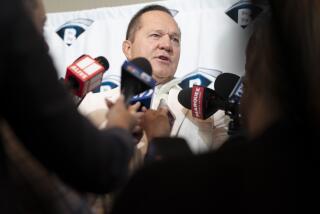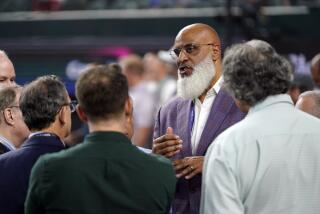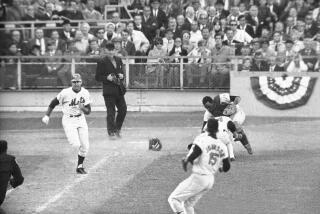Baseball Talks Go Late, but Settlement Not Near
- Share via
NEW YORK — Representatives of the baseball owners and players negotiated for 6 1/2 hours Tuesday night, but remained stalemated on the critical issue of arbitration eligibility.
“Anybody who thought an agreement was in sight simply wasn’t right,” Don Fehr, executive director of the Major League Players Assn., said when the first substantive collective bargaining session in 10 days ended here at 12:30 Wednesday morning.
Said Gene Orza, associate general counsel of the union:
“They keep trying to portray the players as wanting more, more and more by offering proposals that are designed to be rejected.”
The Tuesday night meeting began here at 6 p.m. after an afternoon meeting of the owners’ Player Relations Committee led to a decision to cancel a quarterly owners meeting scheduled for Thursday in Dallas.
Alluding to the belief of both sides that an agreement has to be reached this week if the season is to open on April 2 as scheduled, Bud Selig, owner of the Milwaukee Brewers and chairman of the PRC, said there was no sense conducting an owners meeting in Dallas when the owners can be updated by phone.
“In the world of priorities,” Selig said, “what could be more important than staying here to negotiate?”
The length of the ensuing negotiating session--which began on Day 20 of the owners’ spring training lockout and ended on the morning of Day 21--seemed another reflection of the desire to avoid a delay in the opening of the season.
There was further evidence of that as Commissioner Fay Vincent rejoined the PRC negotiating team, and the union, for the first time, presented a series of four or five concepts designed to bridge the differences on arbitration.
The players want the eligibility standard rolled back to two years. The owners want it kept at three and refused, even in theory, Fehr said, to discuss the concepts he presented Tuesday night, each primarily based on a service requirement for players with more than two but less than three years in the major leagues.
In addition, he said, the owners are now saying that the 20% maximum pay cut has to be waived for players who are eligible for arbitration. Fehr called that a definite step backward and said “no self-respecting union can live with” the refusal of the clubs to roll back eligibility considering industry revenue has increased $500 million since 1985 when the union gave up the year in response to club claims of financial distress.
Charles O’Connor, general counsel of the PRC, reiterated that the owners feel they have no room for movement in the eligibility issue and said that waiving the maximum-cut rule was an attempt to put equity in the system.
More to Read
Are you a true-blue fan?
Get our Dodgers Dugout newsletter for insights, news and much more.
You may occasionally receive promotional content from the Los Angeles Times.








